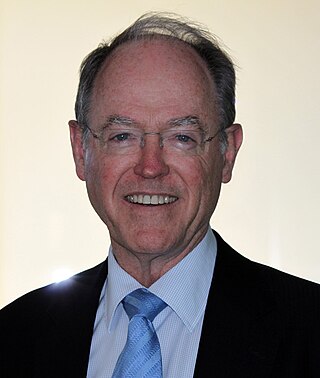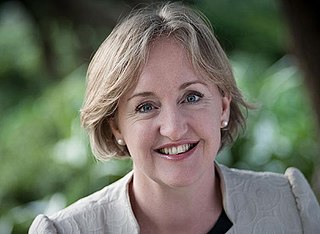| | ||||||||||
| ||||||||||
| ||||||||||
| ||||||||||
The New Zealand National Party leadership election was an election for the National leadership position in 2006 following the resignation of Don Brash.
| | ||||||||||
| ||||||||||
| ||||||||||
| ||||||||||
The New Zealand National Party leadership election was an election for the National leadership position in 2006 following the resignation of Don Brash.
In November 2006, after months of speculation, Don Brash announced his resignation as leader of the National Party following the release of Nicky Hager's book The Hollow Men which focused on Brash's conduct as leader and his secret dealings concerning the Exclusive Brethren. Shadow Finance Minister John Key was picked by the media as most likely to win the leadership, though former leader Bill English appeared to be running again leading a faction of 10–14 MPs. A contest was avoided on the weekend before the contest where a deal was worked out that saw English withdraw in return for the deputy leadership and finance portfolio. [1]
As a result, John Key was duly elected unopposed as Brash's replacement (with English as his deputy) and consequently became Leader of the Opposition. [2]
The New Zealand National Party, shortened to National or the Nats, is a centre-right New Zealand political party. It is one of two major parties that dominate contemporary New Zealand politics, alongside its traditional rival, the Labour Party.

ACT New Zealand, also known as the ACT Party or simply ACT, is a right-wing, classical-liberal and conservative political party in New Zealand. It is currently led by David Seymour, and is in coalition with the National and New Zealand First parties, as part of the Sixth National government.

Donald Thomas Brash is a former New Zealand politician who was Leader of the Opposition and leader of the New Zealand National Party from October 2003 to November 2006, and leader of the ACT New Zealand party for seven months from April to November 2011.

Sir Simon William English is a New Zealand former National Party politician who served as the 39th prime minister of New Zealand from 2016 to 2017. He had previously served as the 17th deputy prime minister of New Zealand and minister of finance from 2008 to 2016 under John Key and the Fifth National Government.

Gerard Anthony Brownlee is a New Zealand politician and the 32nd speaker of the New Zealand House of Representatives. He was first elected as a member of the New Zealand House of Representatives for Ilam in 1996, representing the National Party. He became a list MP in 2020.

David Richard Cunliffe is a New Zealand management consultant and former politician who was Leader of the New Zealand Labour Party and Leader of the Opposition from September 2013 to September 2014. He was Member of Parliament (MP) for Titirangi and then New Lynn for the Labour Party between 1999 and 2017. He served as the Minister of Health, Minister for Communications and Information Technology and Minister of Immigration for the Fifth Labour Government of New Zealand from October 2007 until November 2008.

David William Parker is a New Zealand Labour Party politician who served as Attorney-General, Minister for the Environment, Minister of Transport and Associate Minister of Finance in the Sixth Labour Government. He previously served as a Cabinet Minister in the Fifth Labour Government, Deputy Leader of the New Zealand Labour Party and Deputy Leader of the Opposition from September 2013 to September 2014, and as interim Leader of the Labour Party from September to November 2014. He represented the Otago electorate at the 47th Parliament and has since served as a list MP.

Sir John Phillip Key is a New Zealand retired politician who served as the 38th prime minister of New Zealand from 2008 to 2016 and as leader of the New Zealand National Party from 2006 to 2016. After resigning from both posts in December 2016 and leaving politics, Key was appointed to the board of directors and role of chairman in several New Zealand corporations. After his father died when he was eight, Key was raised by his single mother in a state-house in the Christchurch suburb of Bryndwr. He attended the University of Canterbury and graduated in 1981 with a Bachelor of Commerce. He began a career in the foreign exchange market in New Zealand before moving overseas to work for Merrill Lynch, in which he became head of global foreign exchange in 1995, a position he would hold for six years. In 1999 he was appointed a member of the Foreign Exchange Committee of the Federal Reserve Bank of New York until leaving in 2001.

Murray Stuart McCully is a former New Zealand politician. He is a member of the National Party, and served as Minister of Foreign Affairs from 2008 to 2017.

The 48th New Zealand Parliament was a term of the Parliament of New Zealand. Its composition was determined at a general election held on 17 September 2005. The new parliament met for the first time on 7 November 2005. It was dissolved on 3 October 2008.

Grant Murray Robertson is a retired New Zealand politician and member of the Labour Party who served as the Minister of Finance from 2017 to 2023, as Minister of Foreign Affairs in November 2023, and as the 19th Deputy Prime Minister of New Zealand from 2020 to 2023. He was the member of Parliament (MP) for Wellington Central from 2008 to 2023.

Simon Joseph Bridges is a former New Zealand politician and lawyer. He served as Leader of the National Party and Leader of the Opposition between 2018 and 2020, and as the Member of Parliament for Tauranga from the 2008 election to May 2022, when he resigned.

John Spencer Boscawen is a former New Zealand politician. He is a member of the ACT New Zealand Party and served as a member of the New Zealand House of Representatives from 2008 to 2011.

Paul Jonathan Goldsmith is a New Zealand historian and politician. The biographer of several leading right-wing political and business figures, he was first elected a list member of the New Zealand House of Representatives for the National Party at the 2011 election.
The 2016 New Zealand National Party leadership election was held on 12 December 2016 to determine the next Leader of the National Party and the 39th Prime Minister of New Zealand. A secret exhaustive ballot of the 59-member National parliamentary caucus was to be used in the event of a contested leadership.
The Shadow Cabinet of Bill English formed the official Opposition in the 46th and 47th New Zealand Parliaments while Bill English led the New Zealand National Party, which was the largest party not a member of the Government. English was elected National Party leader unopposed in October 2001. He led the Party to its worst-ever result at the 2002 general election and was replaced as leader by first-term MP Don Brash in October 2003.

The New Zealand National Party leadership election was an election for the National Party leadership position held in 2003.

The 2018 New Zealand National Party leadership election was held on 27 February 2018 to determine the 12th Leader of the National Party. On 13 February 2018, Bill English announced his resignation as leader of the National Party, effective on 27 February 2018. He left Parliament on 13 March 2018. On 20 February, Deputy Leader Paula Bennett announced that a concurrent deputy leadership election would take place, in which she would stand.

The Shadow Cabinet of Simon Bridges formed the official Opposition in the 52nd New Zealand Parliament. It comprised all members of the New Zealand National Party, which was the largest party not a member of the Government.

The Shadow Cabinet of Judith Collins formed the official Opposition in the 53rd New Zealand Parliament, and previously in the 52nd Parliament. It comprised the members of the New Zealand National Party, which is the largest party not a member of the Government. On Collins' dismissal as leader on 25 November 2021, the cabinet essentially ceased to exist, but what remained was de jure led on an interim basis by her deputy leader, Shane Reti, until the next leadership election. The cabinet was succeeded by that of Christopher Luxon.